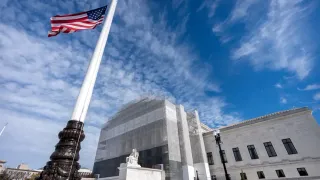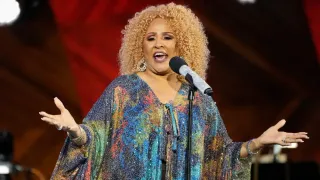November 11, 2016
Immigrants Gripped by Deportation Fears with Trump Election
Astrid Galvan and Amy Taxin READ TIME: 4 MIN.
PHOENIX - President-elect Donald Trump launched his candidacy on an anti-immigrant sentiment and has vowed to repeal a key Obama administration program that shields hundreds of thousands of people from deportation.
Now, many immigrants in the country illegally, or with relatives who are, fear deportation and separation from their families.
In immigrant-heavy areas like Los Angeles and Phoenix, activists are scrambling to provide informational meetings for immigrants to help them protect themselves from deportation. Others want legal immigrants to apply for citizenship so they can eventually obtain legal status for relatives.
"The more we can naturalize people and stabilize our families and root our communities the better," said Julio Perez, executive director of California's Orange County Labor Federation, which is sponsoring naturalization events in response to the election.
Here are stories from some immigrants who fear what a Trump presidency could bring.
WORKING NOW BUT FEARING DEPORTATION
Thirty-two-year-old Karina Ruiz is one of 741,000 immigrants benefiting from the program launched by President Barack Obama called Deferred Action for Childhood Arrivals, or DACA.
It allows young adults to get work permits, social security numbers and protects them from deportation.
The Phoenix mother of three says deferred action allowed her to work and graduate with a biochemistry degree from Arizona State University in 2015. She hopes to be a pharmacist one day.
But Trump has promised to end DACA, and Ruiz fears she could be sent to Mexico and separated from her U.S.-born children.
"I'm not giving up DACA so easily, not going down without a fight," Ruiz said.
WORRIED PARENTS WILL BE SENT TO MEXICO
Michael Nazario, a 27-year-old community activist from Phoenix, is shielded by DACA and married to an American citizen, which should allow him to get permanent residency soon.
He came to the U.S. with his parents illegally when he was three and didn't find out about his legal status until he tried to enlist in the Marine Corps and could not do so without a social security card.
All four of Nazario's siblings were born in the U.S. and his parents would probably have been eligible to stay under an expansion of Obama's DACA program called Deferred Action for Parents of Americans. But the program was challenged in court and never went into effect. Trump also opposes it.
Nazario said a grassroots effort to make sure the program stays in place is now necessary to ensure his parents can stay in Phoenix.
"I feel bothered by this election but it only inspires me to just keep going forward because what's at stake is not only my deferred action but my family as well, my father, my mother and the 11 million immigrants all across the country," Nazario said.
ASPIRING LAWYER FEARS DEPORTATION TO SOUTH KOREA
Matt Lee's parents brought him on a tourist visa to Southern California from South Korea when he was 13. Now 25, he has a college biology degree and wants to attend law school so he can become a patent lawyer.
He was among the first to apply for the DACA program and now works legally, helping other South Koreans fill out immigration forms.
But his dreams of becoming a lawyer are clouded by Trump's vow to get rid of DACA.
Other young immigrants have told him they fear they will be tracked down for deportation because the federal government has their names and addresses, courtesy of their DACA applications. One mother said she is pulling her daughter out of a study abroad program in China to get the daughter back into the U.S. before Trump takes office, Lee said.
"People are not sure if Trump will definitely carry out what he said because it is a crazy idea," he said. "Now the crazy idea of him being elected - that happened. Nothing is certain."
NO GREEN CARD WITHOUT A RETURN TO MEXICO
Dora Rodriguez has lived in the U.S. illegally for 27 years but has still managed to raise her two U.S.-born children and work at a money transfer business in Santa Ana, California. More than 75 percent of the city's residents are Latino, and nearly half of them were born abroad.
Rodriguez said her daughter is now an adult, and could sponsor Rodriguez for permanent residency.
But Rodriguez, in her 40s, would have to return to Mexico to apply and risk staying there for years to get her papers, leaving behind her teenage son in the U.S.
She remembers anti-immigration sentiment in the 1990s in California but that didn't get her deported. She said she doubted much would end up changing under a Trump presidency.
"When (former California Governor) Pete Wilson was here, I heard the same ... and nothing happened," she said.
AVOIDING POLICE TO AVOID DEPORTATION
Alicia Ramirez, in the U.S. for three decades, doesn't think Trump will be able to target immigrants like her but says she's going to start taking extra precautions soon just to make sure she can stay in Santa Ana.
Ramirez, who is in the country illegally and hands out restaurant fliers on a street lined with money transfer businesses and tamale vendors, said avoiding run-ins with law enforcement officers will be key.
That's more challenging for her and others handing out fliers on the streets than the immigrants working inside offices lining the strip.
"We're afraid," Ramirez said if Trump, "We've got to be careful because the smallest mistake, he's going to kick us out."
Taxin reported from Santa Ana, California.






